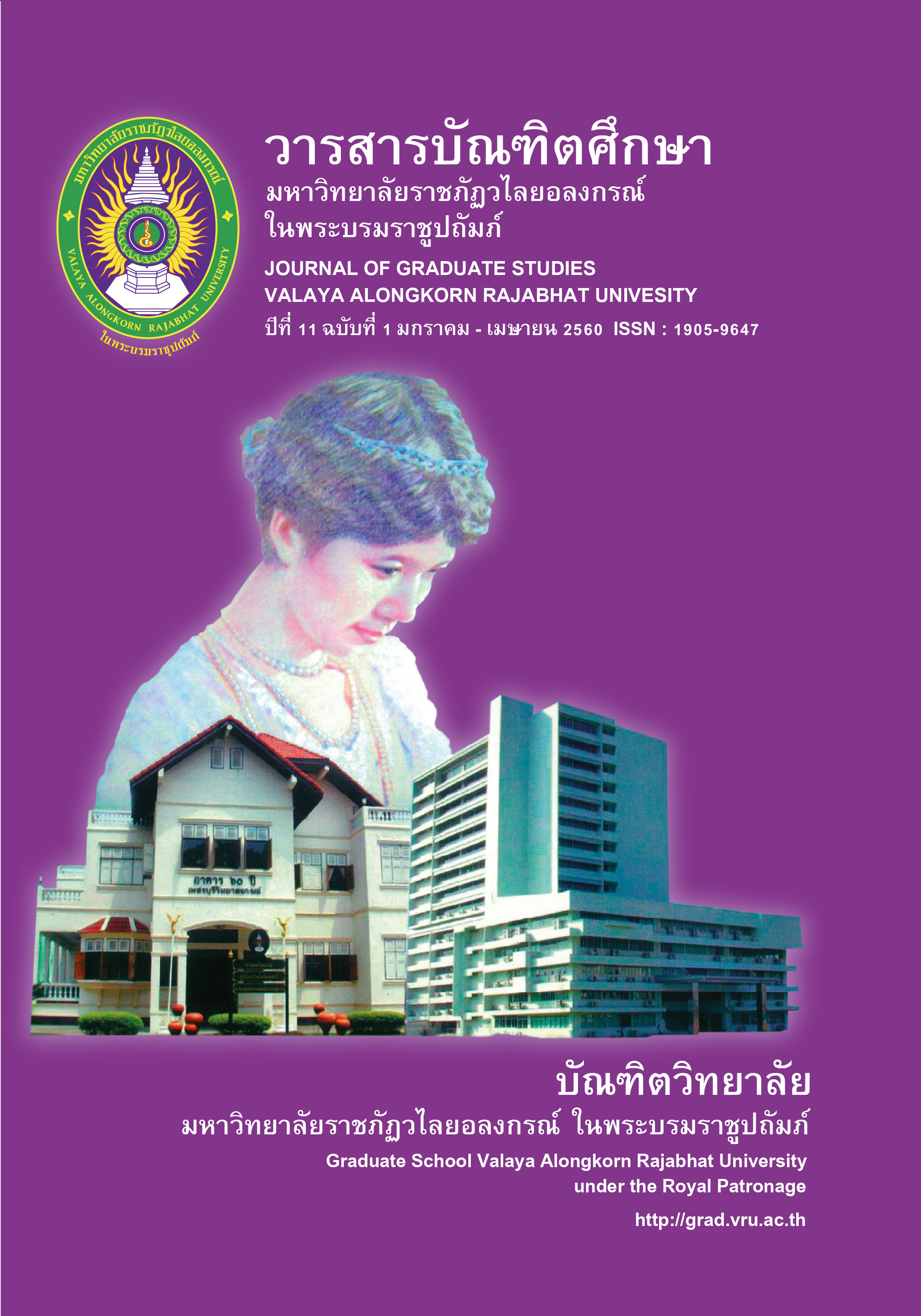ความสัมพันธ์ระหว่างเพศ สาขาวิชา ผลสัมฤทธิ์ทางการเรียนและบุคลิกภาพกับแบบการเรียนของนักศึกษาครู
Main Article Content
บทคัดย่อ
บทคัดย่อ
งานวิจัยนี้มีวัตถุประสงค์ 1) เพื่อค้นหาแบบการเรียนและบุคลิกภาพของนักศึกษาครู คณะครุศาสตร์ มหาวิทยาลัยราชภัฏรำไพพรรณี และ 2) เพื่อหาความสัมพันธ์ระหว่างเพศ สาขาวิชา ผลสัมฤทธิ์ทางการเรียนและบุคลิกภาพกับแบบการเรียนของนักศึกษาครู โดยกลุ่มตัวอย่าง คือ นักศึกษาคณะครุศาสตร์ มหาวิทยาลัยราชภัฏรำไพพรรณี จำนวน 317 คน เครื่องมือที่ใช้ คือ แบบสอบถาม สถิติที่ใช้ในการวิเคราะห์ข้อมูล ได้แก่ความถี่ ร้อยละ ค่าเฉลี่ย ส่วนเบี่ยงเบนมาตรฐาน การทดสอบไคสแควร์การหาระดับของความสัมพันธ์ตามวิธีการของเครมเมอร์วี และการวิเคราะห์ความแปรปรวนแบบสองทาง
ผลการวิจัยพบว่า
นักศึกษาครูมีแบบการเรียนของนักศึกษาอยู่ในระดับต่ำทุกแบบการเรียน และเมื่อจัดอันดับค่าเฉลี่ยของคะแนน พบว่า แบบมีส่วนร่วมมีค่าเฉลี่ยสูงที่สุด (= 22.51, S.D.= 4.80) รองลงมา คือ แบบการเรียนแบบร่วมมือ (
=21.90, S.D.= 4.46) ส่วนแบบการเรียนที่มีค่าเฉลี่ยของคะแนนต่ำที่สุดคือ แบบการเรียนแบบแข่งขัน (
=15.50, S.D.= 4.53) และนักศึกษาครูส่วนใหญ่มีบุคลิกภาพแบบเก็บตัว ผลการหาความสัมพันธ์ระหว่างเพศ สาขาวิชา ผลสัมฤทธิ์ทางการเรียนและบุคลิกภาพกับแบบการเรียนของนักศึกษาครู พบว่า ตัวแปรเพศมีความสัมพันธ์กับแบบการเรียนแบบหลีกเลี่ยงและแบบแข่งขันอย่างมีนัยสำคัญทางสถิติที่ระดับ .05 และมีขนาดของความสัมพันธ์เท่ากับ .359 และ .357 ตามลำดับ และเมื่อพิจารณาถึงตัวแปรสาขาวิชา พบว่าสาขาวิชามีความสัมพันธ์กับแบบการเรียนแบบหลีกเลี่ยงอย่างมีนัยสำคัญทางสถิติที่ระดับ .01 โดยมีขนาดของความสัมพันธ์เท่ากับ .296 ส่วนตัวแปรผลสัมฤทธิ์ทางการเรียน พบว่า ผลสัมฤทธิ์ทางการเรียนมีความสัมพันธ์กับแบบการเรียนแบบร่วมมือและแบบการเรียนแบบอิสระอย่างมีนัยสำคัญที่ ระดับ .05 มีขนาดของความสัมพันธ์เท่ากับ .324 และ .314 ตามลำดับ อย่างไรก็ตามเมื่อพิจารณาถึงตัวแปรบุคลิกภาพกับแบบการเรียนของนักศึกษาครู พบว่าบุคลิกภาพมีความสัมพันธ์กับแบบการเรียนแบบอิสระแบบพึ่งพาและแบบแข่งขันอย่างมีนัยสำคัญทางสถิติที่ระดับ .01 มีขนาดของความสัมพันธ์เท่ากับ .399, .370 และ .349 ตามลำดับและเมื่อพิจารณาถึง บุคลิกภาพแต่ละแบบ พบว่า บุคลิกภาพแบบเก็บตัวมีความสัมพันธ์กับแบบการเรียนแบบอิสระ (r=.451) แบบแข่งขัน (r=.425) และแบบร่วมมือ (r=.407) ส่วนบุคลิกภาพแบบแสดงตัวมีความสัมพันธ์กับแบบการเรียนทุกแบบ
ABSTRACT
The objectives of this research were to 1) to investigate the learning styles and personality of student-teachers and 2) to study relationships between gender, majors’ subject, academic achievement and personality with learning styles of student teacher. The samples consisted of 327 student-teachers in class level three who were in the 1st semester of the academic year 2012, faculty of education, Rambhai Barni Rajabhat University. These samples were selected from population the data were gathered by questionnaires. For statistical analysis the frequency, mean, percentage, standard deviation, Chi-square test, Cramer’s V Coefficients, Pearson product moment correlation coefficients and Two-way analysis of variance.
The results were as follows:
The student-teachers had low level of all learning styles. When compared between six learning styles, it was found that in participant learning styles has been mostly mean scores (= 22.51, S.D.= 4.80), the next was collaborative learning styles (
=21.90, S.D.= 4.46) and the competitive learning styles was lowest level (
=15.50, S.D.= 4.53). The student-teachers had mostly introvert personality. The avoidance learning styles and competitive learning styles were significantly associated with gender. The Cramer’s V coefficients of the associated were .359 and .357 respectively. The avoidance learning styles was significantly associated with majors’ subject at .01 levels. The Cramer’s V coefficient of the associated was .296. The collaborative learning styles and dependent learning styles were significantly associated with academic achievement. The Cramer’s V coefficients of the associated were .324 and .314 respectively. The independent learning styles, dependent learning styles and competitive learning styles were significantly associated with personality at level .01. The Cramer’s V coefficients of the associated were .399, .370 and .349 respectively. When considered in each aspect of personality, it was found that the introvert personality had relationships with independent learning styles (r=.451), avoidance learning styles (r=.425) and collaborative learning styles (r=.407). Extrovert personality had relationships with learning styles in overall.
Article Details

อนุญาตภายใต้เงื่อนไข Creative Commons Attribution-NonCommercial-NoDerivatives 4.0 International License.
บทความทุกเรื่องได้รับการตรวจความถูกต้องทางวิชาการโดยผู้ทรงคุณวุฒิ ทรรศนะและข้อคิดเห็นในบทความ Journal of Global of Perspectives in Humanities and Social Sciences (J-GPHSS) มิใช่เป็นทรรศนะและความคิดของผู้จัดทำจึงมิใช่ความรับผิดชอบของบัณฑิตวิทยาลัย มหาวิทยาลัยราชภัฏวไลยอลงกรณ์ ในพระบรมราชูปถัมภ์ กองบรรณาธิการไม่สงวนสิทธิ์การคัดลอก แต่ให้อ้างอิงแหล่งที่มา


